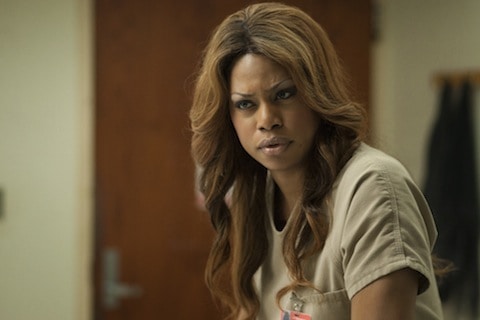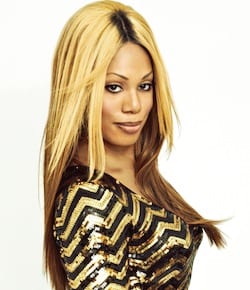If you have not yet indulged in a binge-watching session of the Netflix original series Orange Is the New Black, consider this a warning: You are missing out on the best show of the summer.
Inspired by the true story of a middle-class woman sent to prison for a crime she committed years earlier, Orange Is the New Black dives deep into the lives of a diverse cast of female inmates. These women's layered stories are revealed through an extremely effective use of flashbacks, creating a prism effect as their past reflects off their present, their relationships with one other and, ultimately, the viewer. In a television landscape punctuated by male antiheroes, such a compelling collection of antiheroines is a revelation.
The show has already garnered praise for its exploration of the prison system, and for its handling of race, class, gender and sexuality. However, it's transgender inmate Sophia Burset that is inspiring a conversation not only around transgender persons in prison, but transgender characters and the actors who portray them.
In Orange Is the New Black, Sophia is played by actress, producer and transgender activist Laverne Cox. After making history as the first African-American transgender woman to appear on a reality television program (VH-1's I Want to Work for Diddy), she became the first African-American transgender woman to produce and star in her own TV show, (VH-1's TRANSform Me). Her performance as Sophia is a standout on a series showcasing one of the strongest ensemble casts around.
Yesterday, Cox spoke with reporters about her experience as a transgender actress, her connection to her character and the pressure to be an inspiration for others. Check out some highlights of that conversation below.
More, AFTER THE JUMP…
What are some of the constraints you feel like you face as a trans actress?
The constraints really come from the outside, you know? As an artist, I think it's really important not to put any kind of limitations or constraints on myself. I think they come from an industry that has in their mind that trans women can't play cisgender women; that people aren't going to connect to trans characters; or that shows aren't going have good ratings if there's a trans character on it. Things like that.
So I think the industry has to change, and I think their ideas have to begin to change about who trans people are and what it means to have trans folks playing ourselves and playing characters that are written as trans on television.
I'm hopeful that Orange is the New Black will change the game in those terms.
Why is it important for transgender people to play the transgender roles?
When I've seen trans characters up on screen played by trans actors, it gives me hope and inspiration that I can be up there doing it as well, but also it validates my experience. It makes me feel like I am not alone.
I think everyone needs to feel a sense of connection, a sense of belonging. And that happens interpersonally, but I think it also needs to happen in our representations in mainstream media, so that when we see ourselves up on the screen and we see our stories, we feel less alone, we feel less invisible. Because I think for trans folks so often we are sort of overseen, but underrepresented. In a lot of ways we hear about trans folks as victims of violence or as criminals or something like that, and we don't really get to see the reality and the humanity and the diversity of the trans experience.
So I think it validates the experience, and I think it also teaches the world that there's different people and that there are different lessons that we can learn from diversity. I think being around people who are different from us teaches us wonderful lessons if we choose to listen to those lessons.
What is it about [the show] that you think makes everybody love it so much?
The writing is incredible. It's really smartly written and I think the general public is not given enough credit a lot for being able to really embrace smart shows.
I mean, we see a lot of smart TV on now, and I think that the public has really just been craving this, to hear women's stories and see women who look different … And then to see that those stories are being told with such humanity and such multi-dimensionality, the public has really been craving that. I know the conventional wisdom in the business is that you have to look a certain way and whatever. Our show is challenging all that.
Do you think with the success of this series we'll start seeing more complex roles for all types of women?
I hope so. I think back to Sex in the City, which was this huge breakthrough moment and one of my favorite shows of all-time, and how different our show is from that show, first of all, but then how there were sort of copycats after that, and they weren't necessarily as good.
What I think is important about our show is that yes, there's women of different races, ages, body types in the show, but they're really well-written characters with really smart storylines. It's a really smart show.
So if there are copycats, they need to, you know, bring it.
Because no one's journey is the same, what inspirations or parallels from your own transition help you with this role?
I've said often that Sophia is very different from me in that she chose this job and she tried to sort of overcompensate, pre-transition, and a lot of trans women do that. They get into these very sort of masculine jobs and do all these traditionally very masculine things to try to sort of not be trans anymore.
I never did that. I was very feminine, and I grew up studying classical ballet, which is, you know, not necessarily considered this big masculine thing.
So I just never was able to do that. I was never really interested in that even. So that's really different from me and Sophia, but we're so different. She's attracted to women. The only time I've kissed women has been on TV and for movies where I've been working.
In so many ways we're different, but the ways in which we're similar are that once we decided that we needed to transition, we did whatever it took to get there. I didn't break the law to do it. Sophia broke the law to do it, so that's another place where we're different, and so many ways she and I are very different. But emotionally, we're very similar. Whenever I take on a character – I've said this before – the emotional life of the character is my own.

Also, Sophia has a solid support system with her wife on the show. Who was your support system during those times?
I've been so blessed and so grateful. I've had wonderful therapists over the years, and I've always liked to give a big up to having a really good therapist. I've also done support groups at the LGBT Center here in the city.
Early on in my transition, support groups were really, really important for me just to meet other trans women who were doing other things and I got inspired … When I transitioned, I didn't necessarily believe that having this kind of career was possible, and certainly there weren't any mainstream actors in my support group, but there were trans women who were working on Wall Street who were in real estate, who were computer technologists and who had these fantastic jobs, you know?
I was, like, ‘Oh, OK. I can be trans and do all this stuff.'
You said that Candis Cayne was such an inspiration for you. Do you feel some pressure to be that for other people?
I have felt that pressure, absolutely. I've said this before in interviews, but I think I've imagined when I had a moment like this, where I've connected with a lot of people and it's a popular moment and a popular show, that I would look differently, that I would've maybe had an extreme makeover in terms of cosmetic surgery and I may be 20 pounds thinner and that I would maybe in some ways be a different person.
This moment is happening now, and I'm just me. And so what I've taken from that is that my job is to be me and to do a lot of soul searching so that I can tell the truth to myself about myself, and then tell the truth when I have a moment like this, to do a conference call with all the fantastic reporters, that I am in the truth of who I am and that is my job.
And so yes, I feel pressure. I haven't actually talked about prison reform yet during this conversation. I'm talking to a lot of LGBT press. I haven't really talked about trans people, our issues being more foregrounded in LGBT circles, which I think is really important and essential. I think that it's really about gender more than anything and gender expectations that oppress LGBT people in general. Sometimes it's about who you're having sex with, but a lot of times as we enter culture, it's about gender and it's about expectations. I can't think of how many gay male friends of mine who have been told that they're not masculine enough by other gay men.
And so there's this whole sort of gender expectation thing. So these are things I would want to say to LGBT press. And since I'm saying it now that I have the opportunity, the pressure is I want to talk about things that are important in terms of issues that affect my people, transwomen of color. Our unemployment rate is four times that of the national average. The homicide rate among LGBTQ people, the highest homicide rate is among trans women for the past several years in a row.
Our people, trans women, are dying on the streets, and we need support, we need help, we need a focus in terms of the movement on our issues.





